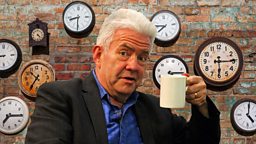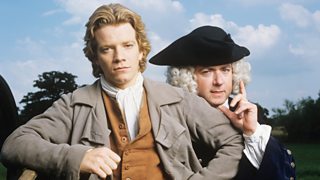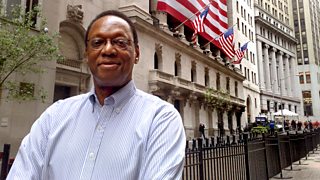Why Ian McMillan loves being early
Early-bird poet and broadcaster Ian McMillan tries to arrive early to everything. In I'm Here. Where Are You? he investigates why some people are happiest being early and others are content to be late. He told us a bit more about why the thought of being late brings him out in a cold sweat...

I often do shows with my musician mate Luke Carver Goss in village halls all over the country; on our contract it says that we’ll arrive at 17.30 to set up but nothing makes me happier, and irritates Luke more, than arriving at 16.30. I love being early and I have a fear of being late, and even if I’m on time that makes me nervous because I think I’m somehow late, and my programme on BBC Radio 4 I’m Here, Where Are You? investigates my perpetual efforts to take charge of the clock and make it do as I blooming well tell it.
Even if I’m on time that makes me nervous because I think I’m somehow late.
A few months ago Luke and I arrived at a village hall ridiculously (his words, not mine) early and we sat in the car for a while and then I tried the door and, miraculously (my words, not his) it opened. I found the kitchen and made us a cuppa. We were in that mystical time-frame known as ‘being there before the organiser’ and I was happier than I’ve been for a long, long time.
The programme investigates why I like to be early, but it comes to no real conclusions and it certainly doesn’t get me to change my mind. I talk to psychologists and therapists, I sit on station platforms because I’ve arrived far too early for the train, and I try my very best to arrive at Luke’s house just in time, which is the kind of jeopardy producers like to put presenters in.
I speculate that being early is all about power, which is counterintuitive in a way, because at least one person in the programme tells me that lateness is a sign of power because you’re keeping the audience waiting and you’re ultimately making them dance to your tune.

On the contrary, being early is being able to hold all the reins, to take absolute control. Here I am in the village hall kitchen and here are the organisers. I welcome them to my space and I offer them a cup of their own tea. They are placed on the back foot, even though they are not late and I am firmly on the front foot, supping tea and eating a biscuit.
Being early is being able to hold all the reins, to take absolute control.
Luke and I have written a song about his favourite phrase, "running late’; I’ll be waiting for him somewhere and he’ll ring and say he’s ‘not late but he’s running late’ which, for a tick-tock tyrant like me is like a red rag to a bull, a red rag waved late, of course. ‘Does that mean you’re late?’ I ask. ‘No, I’m running late’ he’ll say, with great certainty. It’s not that he means to run late; he sets off with the best of intentions but the world seems to conspire against him. It’s as though the clock is reaching out a hand to trip him up, to pull him back into the house where he can tidy up.
Enjoy the programme, and if you see me on a station let’s sit and talk about it. I’ll have plenty of time to chat because I’ll have arrived for the train before the one before the one before I was supposed to catch. Not late, but running early, as the song should have said.
-
![]()
I'm Here. Where are You?
Listen to Ian's seriously timely programme.
More from Seriously...
-
![]()
Fake wine – honestly, it’s a thing
Here’s what Radio 4 has uncorked about the fake wine industry.
-
![]()
Five Steps to the Creative World of Cosplay
An insight into the world of fictional characters brought to life by devoted fans.
-
![]()
The death and rebirth of Zora Neale Hurston
Once forgotten, she is now revered by everyone from Alice Walker to Solange Knowles
-
![]()
Seven of literature's lustiest lovers
From Tom Jones to Adrian Mole, have a look at lust in literature.
-
![]()
Meet the cyborgs
Five people who have modified their bodies with technology.
-
![]()
Miles Jupp asks if a woman invented James Bond...
Phyllis Bottome is little known today, but did she inspire Ian Fleming?
-
![]()
Five ways to burst your social media bubble
DJ and presenter Bobby Friction on how to escape the online echo chamber.
-
![]()
The Story of The Green Book by Alvin Hall
A travel guide like no other, for black motorists in the mid-20th Century it was a catalogue of refuge.
-
![]()
Apathy in the UK by Phill Jupitus
The comedian and broadcaster on boredom.
-
![]()
What is a 'curvalicious' body?
Bridgitte Tetteh explores attitudes to female bodies in the black community.
-
![]()
Sitting for David Hockney
Art critic Martin Gayford learns what it's like to be painted by a modern master.
-
![]()
Why having a baby needn’t subdue your inner geek
Five tips from Isy Suttie.
-
![]()
Miles Davis on canvas
The legendary trumpeter's second life as a painter.
-
![]()
Ey Up! It's The Sex Pistols
The Sex Pistols visited Yorkshire twice, but what impression did they leave?
-
![]()
William Shakespeare's America
Robert McCrum traces the Bard's influence in the USA.
-
![]()
Three-Sided Football, A Sport for Anarchist
Ian McMillan watches from the side lines in South London
-
![]()
Why Do Dancers Die Twice?
Should professional dancers careers have to be so brief?
-
![]()
Is Mindfulness Meditation Dangerous?
Jolyon Jenkins investigates whether meditation can do you more harm than good.



















